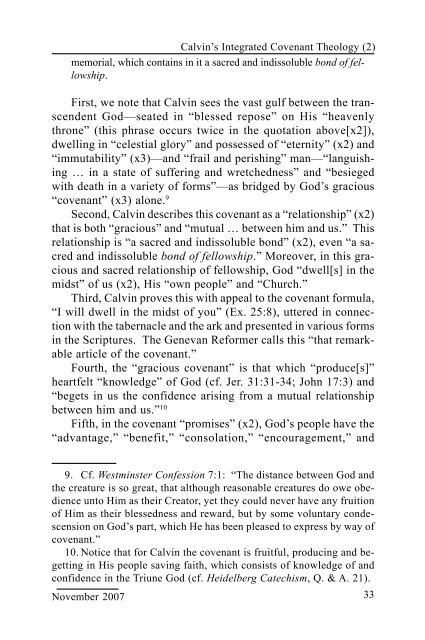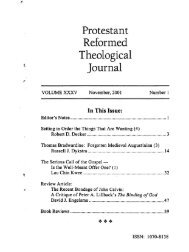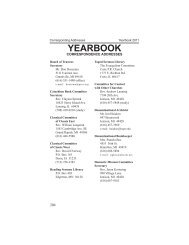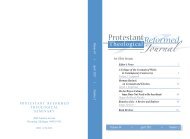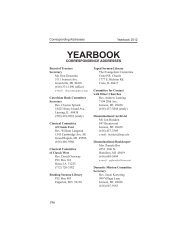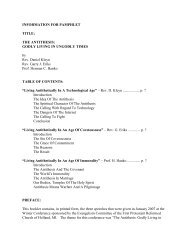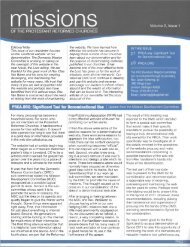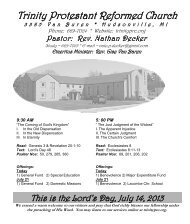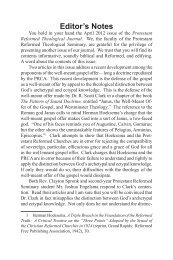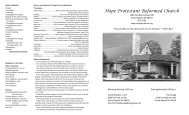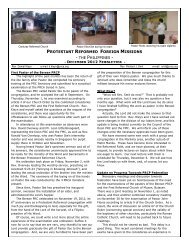November 2007 - Protestant Reformed Churches in America
November 2007 - Protestant Reformed Churches in America
November 2007 - Protestant Reformed Churches in America
Create successful ePaper yourself
Turn your PDF publications into a flip-book with our unique Google optimized e-Paper software.
Calv<strong>in</strong>’s Integrated Covenant Theology (2)<br />
memorial, which conta<strong>in</strong>s <strong>in</strong> it a sacred and <strong>in</strong>dissoluble bond of fellowship.<br />
First, we note that Calv<strong>in</strong> sees the vast gulf between the transcendent<br />
God—seated <strong>in</strong> “blessed repose” on His “heavenly<br />
throne” (this phrase occurs twice <strong>in</strong> the quotation above[x2]),<br />
dwell<strong>in</strong>g <strong>in</strong> “celestial glory” and possessed of “eternity” (x2) and<br />
“immutability” (x3)—and “frail and perish<strong>in</strong>g” man—“languish<strong>in</strong>g<br />
… <strong>in</strong> a state of suffer<strong>in</strong>g and wretchedness” and “besieged<br />
with death <strong>in</strong> a variety of forms”—as bridged by God’s gracious<br />
“covenant” (x3) alone. 9<br />
Second, Calv<strong>in</strong> describes this covenant as a “relationship” (x2)<br />
that is both “gracious” and “mutual … between him and us.” This<br />
relationship is “a sacred and <strong>in</strong>dissoluble bond” (x2), even “a sacred<br />
and <strong>in</strong>dissoluble bond of fellowship.” Moreover, <strong>in</strong> this gracious<br />
and sacred relationship of fellowship, God “dwell[s] <strong>in</strong> the<br />
midst” of us (x2), His “own people” and “Church.”<br />
Third, Calv<strong>in</strong> proves this with appeal to the covenant formula,<br />
“I will dwell <strong>in</strong> the midst of you” (Ex. 25:8), uttered <strong>in</strong> connection<br />
with the tabernacle and the ark and presented <strong>in</strong> various forms<br />
<strong>in</strong> the Scriptures. The Genevan Reformer calls this “that remarkable<br />
article of the covenant.”<br />
Fourth, the “gracious covenant” is that which “produce[s]”<br />
heartfelt “knowledge” of God (cf. Jer. 31:31-34; John 17:3) and<br />
“begets <strong>in</strong> us the confidence aris<strong>in</strong>g from a mutual relationship<br />
between him and us.” 10<br />
Fifth, <strong>in</strong> the covenant “promises” (x2), God’s people have the<br />
“advantage,” “benefit,” “consolation,” “encouragement,” and<br />
9. Cf. Westm<strong>in</strong>ster Confession 7:1: “The distance between God and<br />
the creature is so great, that although reasonable creatures do owe obedience<br />
unto Him as their Creator, yet they could never have any fruition<br />
of Him as their blessedness and reward, but by some voluntary condescension<br />
on God’s part, which He has been pleased to express by way of<br />
covenant.”<br />
10. Notice that for Calv<strong>in</strong> the covenant is fruitful, produc<strong>in</strong>g and begett<strong>in</strong>g<br />
<strong>in</strong> His people sav<strong>in</strong>g faith, which consists of knowledge of and<br />
confidence <strong>in</strong> the Triune God (cf. Heidelberg Catechism, Q. & A. 21).<br />
<strong>November</strong> <strong>2007</strong> 33


